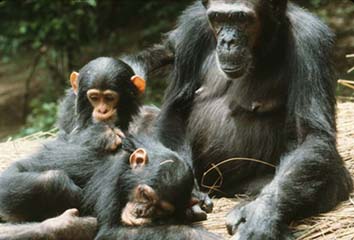The Importance of Mothering

Credit- Jane Goodall
Youngsters first begin
to move about on the ground and then in trees under the
watchful eyes of their mothers. Chimpanzee mothers must
continue feeding and close scrutiny of their youngsters
until they are four or five years-old. During this time,
the child learns adult chimpanzee behaviors from observing
and imitating their brothers, sisters, and other members
of the community.
Chimpanzee mothers
develop better mothering techniques with each infant. Some
mothers are more relaxed with their infants than others.
Whether the mother is very relaxed or tense, energetic
chimpanzee infants constantly try their patience and
ability to keep up with them. They love to examine rocks
and gourds and others objects of play. And they especially
love acrobatic play in trees, which is very stressful for
the mother.
Captive Chimpanzees
Young chimpanzees in
modern zoos have an object rich environment to explore.
When visiting a zoo, one can often see a very young infant
climbing to great heights among tall structural beams,
simulated rocks, and hanging devices designed for exercise
and fun. It is a frightening experience for human
observers watching youngsters cavorting about the tall
areas of the enclosure. One can only imagine the fear and
vexation chimpanzee mothers must experience.
In a zoo environment,
youngsters are not solely dependent on their mothers for
comfort and food. They are able to taste new foods, move
about freely at an early age, or snuggle up for a nap with
Mom or a friend in a favorite spot. Their exuberance for
and curiosity about the world around them reminds us of
our own childhood and those of our children.

